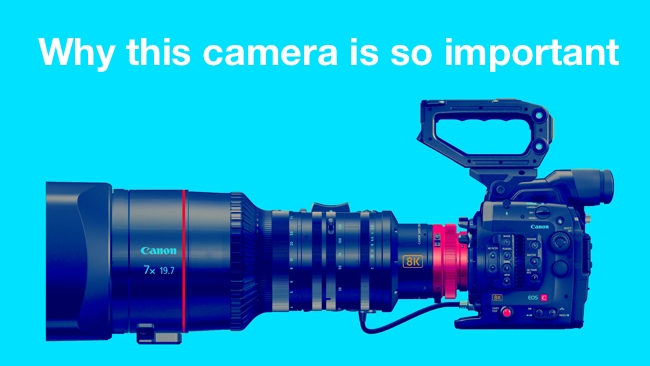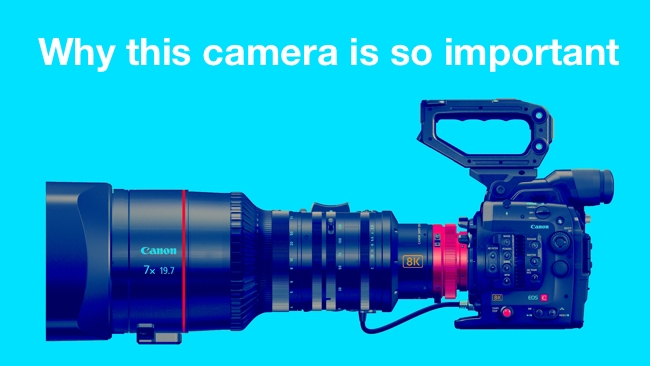
 Canon Cinema EOS 8K camera
Canon Cinema EOS 8K camera
A shock announcement from Canon has everyone talking about 8K and what it means for everyone. Why did Canon make this statement of intent now?
Today's announcement took us all by surprise. I had to read the press release several time to make sure I'd understood it.
In case you haven't seen the news, you can read the statement from Canon here. It seems quite odd for a traditionally conservative Japanese technology company to be talking about its products so far in advance of their release (well, actually, they could be released tomorrow for all we know, but we doubt it).
Now, just in case "traditionally conservative Japanese technology company" sounds like an oxymoron to you, I'll explain what I mean.
Some of the best consumer and professional technology in the world comes from Japan. This is at least in part because the Japanese way with design and manufacturing is to do it methodically. Typically a Japanese company won't release a product until it is so completely finished and tested that there is nothing whatsoever unknown or unpredictable about its behaviour.
This normally works to our advantage, in that that's exactly what we want, because when cameras had no software in them, there were no firmware updates or bugs. They did what they did for the lifespan of the camera and if you wanted a camera that did more or behaved differently, you bought another one. But they were dependable because of that. As you got to know them, they almost became an extension to your body.
Now that cameras are as much software as hardware, this no longer applies. Japanese companies still test products to within an inch of their lives, but software is so complex and - to the user - non deterministic, that the occasional bug slips through and updates are sometimes necessary. Often, though, these updates bring with them good things, like additional features.
So the dependable world of microelectronics and miniaturised engineering has given way to frantic software development and a race to build in enough bandwidth to cope with the huge resolution of todays - and tomorrow's - sensors.
In this software-driven world, product releases are faster and far more competitive. Typical Japanese companies may find this uncomfortable, but if they don't take part in the race, they will be seen as losing it.
Which is why I think Canon made this announcement now. Fairly or unfairly, a lot of criticism has been levelled at Canon for being too slow to release cameras with features that other manufacturers have had for some time. A lot of this has probably come from Canon's decision to wind down the frenzy over DSLR video and focus their video skills on the Cinema EOS range, which are, of course, more expensive than DSLRs.
Here's a typical comment (from RedShark's Facebook Page):
"Talk about missing the point! Why do we want this camera? I don't even have a 4k yet because the companies don't give me what I want! Props for pushing the technological boundaries Canon but give me a semi-pro 4k (£3-5) camera (proper 4k too not UHD) give that camera a 4.4.4 colour space, which records footage internally (on a decent medium) in RAW format where over heating isn't a problem! That would be great."
But the commenter is perhaps missing the point, which is that high end features tend to trickle down into cheaper products. You have to start somewhere with new technology and it's almost always better to do it with low volume products. In any case, the new tech may simply be expensive.
I don't see this announcement as being important in the sense that it brings a lot to those with small budgets. You could say that the comment above is a bit like saying "Why can't I have an Aston Martin for £10,000/$15,000?". The answer is "because it's an Aston Martin". Alternatively you might ask "Why Can't I have an ARRI Alexa for £4000/$6000?". It might just be that ARRI have no interest in producing cameras for the mass market.
Canon is a vastly different company to ARRI, of course. Canon obviously does have a lot of products for the mass market, and they're mostly still cameras.
The iPhone is eating away at the consumer and even the low-end professional end of the market. Undoubtedly Canon will have noticed this. With the performance of high end smartphones encroaching on low-end DSLR territory, Canon will probably have to focus on its mid and high range products. It's clear that for video, while they have several "Traditional" all-in-one camcorders, the EOS Cinema range is very important to them. They won't sell as many as they sell still cameras: this market is vast and largely hidden from the video industry.
The Canon Cinema cameras are very capable devices with excellent image quality and robustly built. The EOS 300 C can stand up to virtually any modern video camera and if the 8K camera is intended to top out the range, it can probably aim at the very summit. It won't be cheap, but Canon will sell enough for it not only to become a familiar sight on set but to make money with it as well.
Meanwhile, the announcement today signals something else as well. It tells us that 8K has moved out of the lab. Of course there have been other 8K cameras for some time. They even make TV programs with them in Japan. RED's Weapon is a real thing. The Sony F65 has an 8K sensor. But Canon is company with a household name making an 8K movie camera.
Do we need 8K? Probably not as a distributable format. But if cameras can shoot in 8K then why not reap the advantages of a massively oversampled image that you can reframe in post to give you incredible flexibility for 4K deliverables? So many people have confirmed that shooting in 4K and downconverting to HD gives a great picture that I can see this being the main use for an 8K camera: shooting in 8K and downsampling to 4K. No more Bayer losses, lower noise and wonderful resolution.
The fact that a "traditional" Japanese technology company is going to put an 8K movie camera into production in the near future is quite simply staggering. 8K is 32 megapixels per frame. That's way more than most still cameras shoot. It may even spawn a new use for the camera: extracting super high resolution stills from video.
We've been saying for some time now that you can't predict what's going to happen in the field of digital video even as little six months in advance. Canon's new 8K EOS Cinema camera is the perfect illustration of that.
Tags: Production



Comments